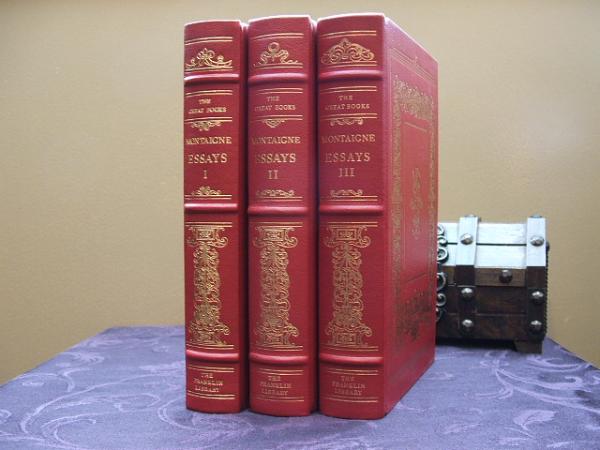Franklin Library Michel de Montaigne books
Essays of Michel de Montaigne - 100 Greatest Books of All Time - 1980
Essays of Michel de Montaigne - Collected Stories of the World's Greatest Writers - 1980
The Works of Michel de Montaigne - Great Books of the Western World - 3 books 1979, 1980
Selected Essays - Oxford Library of The World's Greatest Books - 1982
Easton Press Michel de Montaigne books
Montaigne, Sainte-Beuve, Renan: Essays - The Harvard ClassicsThe Age of Reason Begins: a History of European Civilization in the Period of Shakespeare, Bacon, Montaigne, Rembrandt, Galileo and Descartes: 1558-1648 - The Story of Civilization Vol 7
(This page contains affiliate links for which we may be compensated.)
Michel de Montaigne biography
Michel Eyquem de Montaigne, born on February 28, 1533, in the Aquitaine region of France, is revered as one of the most influential philosophers and essayists of the Renaissance period. His life and work are characterized by a relentless pursuit of self-knowledge, intellectual curiosity, and a profound skepticism towards dogma and prejudice. Montaigne was born into a noble family and received a humanist education that emphasized the classics, literature, and philosophy. After completing his studies in law, he embarked on a career in public service, serving as a magistrate and diplomat in the French court. Despite his official duties, Montaigne's true passion lay in the pursuit of knowledge and wisdom. Inspired by the philosophy of Stoicism and the writings of ancient philosophers such as Seneca and Plutarch, he began to explore the complexities of human nature and the mysteries of existence through the medium of the essay.In 1571, Montaigne retired from public life to his family estate, where he devoted himself to writing and contemplation. It was during this period of seclusion that he produced his masterpiece, Essays (Les Essais), a collection of personal reflections and philosophical musings that would revolutionize the literary form and inspire generations of readers. Essays is celebrated for its intimate and candid exploration of a wide range of topics, including morality, friendship, education, religion, and the human condition. Montaigne's approach to writing was deeply introspective, as he turned his gaze inward to examine his own thoughts, experiences, and emotions with unflinching honesty and self-awareness.
Central to Montaigne's philosophy is the idea of skepticism and the recognition of the limitations of human knowledge. He famously declared, Que sais-je? (What do I know?), acknowledging the inherent uncertainty and complexity of life and the impossibility of attaining absolute truth. Montaigne's essays are characterized by their conversational tone, playful wit, and keen observational skills. He embraced contradiction and paradox, recognizing the multifaceted nature of reality and the diversity of human experience.
Throughout his life, Montaigne remained deeply engaged with the political and intellectual currents of his time, participating in debates on religious tolerance, cultural relativism, and the nature of authority. His writings continue to resonate with readers today, offering timeless insights into the human psyche and the perennial questions of existence. Michel de Montaigne passed away on September 13, 1592, leaving behind a rich legacy of philosophical inquiry and literary innovation. His essays remain a testament to the power of self-examination and the importance of intellectual curiosity in the quest for meaning and understanding in the world.
